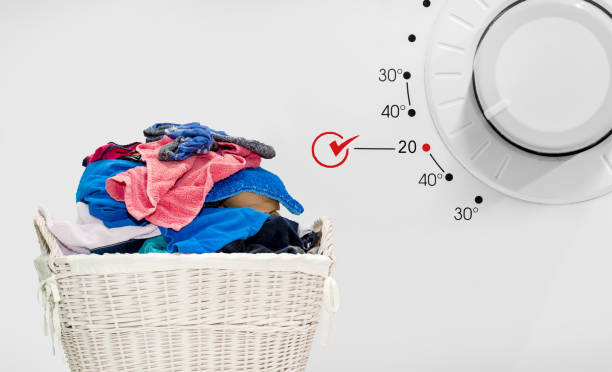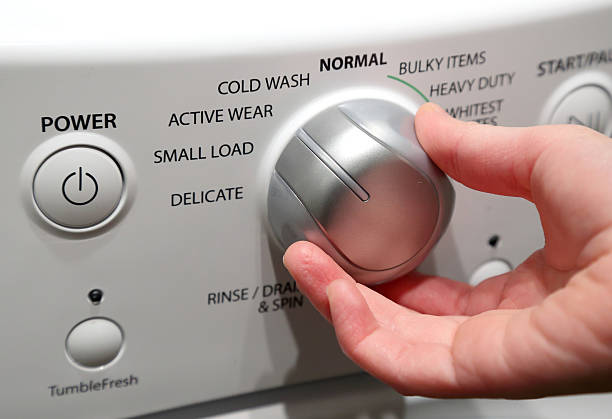As you increase your awareness about energy consumption and its impact on the planet, the choice of water temperature in your washing machines has gained significance.
So, can you run a washing machine with cold water? It has emerged as a sustainable alternative, touted for its energy efficiency and fabric preservation. However, it also raises concerns about the effectiveness of stain removal and sanitization.
I will provide everything you need to know if you can run your washing machine with cold water.
Can You Run a Washing Machine With Cold Water?
Yes, you can run a washing machine with cold water. Most modern washing machines are designed to be versatile and allow you to choose the water temperature for your laundry.
Cold water washing has several benefits:
- Energy Efficiency: Using cold water for washing can significantly reduce the energy consumption of your washing machine. Heating water accounts for a significant portion of the energy used in a laundry cycle, so washing with cold water is more environmentally friendly and can save you money on your energy bills.
- Fabric Preservation: Cold water is gentler on fabrics than hot water, so it’s particularly suitable for delicate items or clothing that might be prone to shrinking or fading when exposed to hot water.
- Color Retention: Cold water helps to preserve the color of your clothing, preventing colors from bleeding or fading as quickly as they might in hot water.
- Stain Removal: While hot water can be more effective at removing certain types of stains, many laundry detergents today are formulated to work well in cold water. Pre-treating stains and using a good detergent can help compensate for the lower water temperature when dealing with stubborn stains.
- Environmental Benefits: Using cold water for laundry reduces the overall carbon footprint of your laundry routine, as it requires less energy to heat the water.

The Basics of Washing Machine Temperature Settings
- Hot: This setting uses water at the highest temperature available, usually around 130 °F (54 °C). Hot water is effective for removing tough stains and killing bacteria, making it ideal for items like bed linens and underwear. However, it can cause fading and damage to some fabrics and is less energy-efficient.
- Warm: Warm water falls in the range of 90-110 °F (32-43 °C). It strikes a balance between cleaning power and fabric care. It’s suitable for most everyday laundry items, such as clothing and towels.
- Cold: Cold water is typically below 80 °F (27 °C). It’s gentler on fabrics, preserving colors and reducing the risk of shrinkage. Cold water is excellent for washing delicate garments like silk, wool, and clothing with bright colors or prints.
The impact of temperature on laundry
- Hot water is effective at breaking down grease, oils, and protein-based stains, such as blood and sweat.
- Warm water can help remove most stains effectively while being more gentle on fabrics than hot water.
- Cold water is ideal for preserving the color and quality of fabrics and is suitable for most everyday laundry needs. It’s particularly useful for dark or brightly colored clothing to prevent fading.
It’s important to note that using the right water temperature can significantly impact the overall cleanliness and longevity of your clothes.
For instance, washing delicate fabrics in hot water can cause them to lose their shape, while using cold water for heavily soiled items may not provide thorough cleaning.
Energy efficiency considerations
- Hot water washing consumes the most energy among the temperature settings, primarily due to the energy required to heat the water. This can lead to higher electricity or gas bills.
- Warm water is more energy-efficient than hot water because it requires less heating, and it can achieve good cleaning results for most loads.
- Cold water is the most energy-efficient option, as it doesn’t require any additional energy to heat the water. Choosing cold water can significantly reduce your washing machine’s energy consumption and save you money in the long run.
Energy efficiency is not only environmentally friendly but also cost-effective. As utility costs rise, using cold water whenever possible can make a noticeable difference in your monthly expenses. It’s an eco-conscious choice that aligns with sustainability goals and reduces your carbon footprint.
Note: For specific energy efficiency ratings and calculations, you can refer to resources like the U.S. Department of Energy’s guide on energy-efficient clothes washers.
Advantages of Using Cold Water
Cold water washing is a fantastic method for maintaining the vibrancy and integrity of your clothes. When you use hot or warm water, there’s a greater risk of color fading and fabric deterioration over time.
Cold water is gentle, causing less stress on fibers and reducing the chances of shrinkage, stretching, or pilling. This preservation of fabric quality ensures that your garments stay in excellent condition for longer, ultimately saving you money on replacements.
Furthermore, one of the most significant advantages of cold water washing is its energy efficiency. Since you don’t need to heat the water, you consume less energy with each laundry cycle. This translates into lower electricity or gas bills.
Moreover, Cold water washing aligns with environmentally responsible practices. By reducing energy consumption, you’re decreasing the demand for fossil fuels, which in turn lowers greenhouse gas emissions. This contributes to a healthier planet and helps combat climate change.
Read more: Can You Use Washing Machine Hose On A Water Heater?
When Should You Use Cold Water?
Cold water is a versatile option suitable for a wide range of laundry loads. Here are some laundry items and scenarios where using cold water is particularly advantageous:
- Bright or Dark Colored Clothing: Cold water helps preserve the vibrancy of colored garments, preventing fading and color bleeding. This is crucial for maintaining the longevity of your favorite clothes.
- Delicate Fabrics: Cold water is gentle on delicate fabrics like silk, lace, and wool. It minimizes the risk of damage, stretching, or deformation that can occur with hot water.
- Semi-Synthetic Fabrics: Fabrics that contain a blend of natural and synthetic fibers, such as cotton-polyester blends, often respond well to cold water washing. It prevents shrinkage and maintains fabric integrity.
- Normal Daily Wear: For everyday clothing like jeans, T-shirts, and casual wear that aren’t heavily soiled, cold water is usually sufficient for effective cleaning.
How to handle tough stains with cold water
Cold water can be surprisingly effective at removing tough stains when combined with the right stain-fighting techniques:
- Pre-Treat Stains: Before tossing stained items into the washing machine, pre-treat the stains with a stain remover or a mixture of cold water and laundry detergent. Gently blot or rub the stain with a soft brush or cloth.
- Soak in Cold Water: For stubborn stains like blood or wine, soak the stained garment in cold water for an hour or more before washing. This can help loosen the stain.
- Use an Enzyme-Based Detergent: Enzyme-based detergents are effective at breaking down protein-based stains. Look for detergents formulated for cold water washing with enzymes to boost stain removal.
- Check Garment Labels: Always follow the care instructions on garment labels. Some fabrics may require specific cold water temperatures or detergent types to maintain their quality.
Combining cold water with the right detergents
Using the right detergent is crucial when washing with cold water:
- Cold Water Detergents: Some detergents are formulated specifically for cold water use. They contain enzymes and surfactants optimized for cleaning in lower temperatures. Look for these products to maximize cleaning power.
- Front-Loading Washing Machines: If you have a front-loading machine, it may be more efficient at cold water washing compared to top-loading machines. Front-loaders tumble the laundry in a way that maximizes detergent contact with fabrics.
- Follow Manufacturer Recommendations: Refer to your washing machine’s manual for guidance on cold water settings and detergent usage. Manufacturers often provide valuable tips to ensure effective cleaning.
Mastering cold water washing for various laundry loads, stains, and fabric types allows you to enjoy the benefits of gentler cleaning while still achieving excellent results.

The Exceptions: When to Avoid Cold Water
While cold water is a versatile option for most laundry, there are instances where hot or warm water is essential. These include:
- Heavy Soiling: When dealing with heavily soiled items, such as work clothes or cloth diapers, hot or warm water is more effective at breaking down and removing dirt, grease, and oils.
- Illness or Contamination: During illness, washing bed linens, towels, and clothing in hot water can help eliminate bacteria and viruses.
- Household Allergens: If someone in your household has allergies, hot water can be necessary to remove allergens like dust mites from bedding and curtains.
Delicate fabrics like silk, lace, and cashmere require gentle treatment. Always check the care label, and when necessary, opt for cold water or a specialized delicate cycle with a mild detergent.
Moreover, warm water can be crucial for preventing mold and mildew growth in certain situations:
- Towels and Bathmats: Towels and bathmats, which stay damp for longer periods, benefit from occasional warm water washing to kill bacteria and fungi.
- Front-Loading Machines: If not properly maintained, front-loading washing machines can develop mold and mildew in their gaskets and drums. Running a hot or warm water cycle with vinegar or a washing machine cleaner can help prevent this issue.
Conclusion
Can you run a washing machine with cold water? Running a washing machine with cold water is not only possible but often highly recommended.
Cold water washing preserves fabric colors and quality, reduces energy consumption and utility costs, as well as offers environmental benefits by minimizing carbon footprint.
While some exceptions require hot or warm water, modern detergents, and washing machines are designed to clean laundry effectively in cold water settings.
Embracing cold water washing saves money and contributes to fabric longevity and a more sustainable, eco-conscious lifestyle, making it a practical and environmentally friendly choice for everyday laundry.







